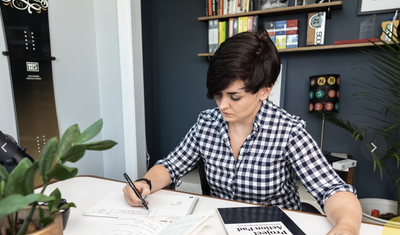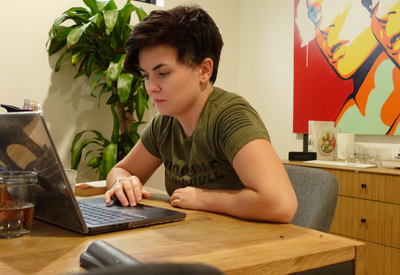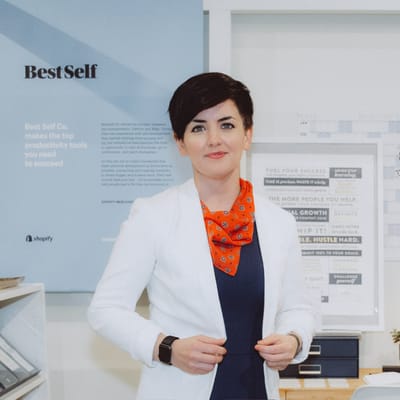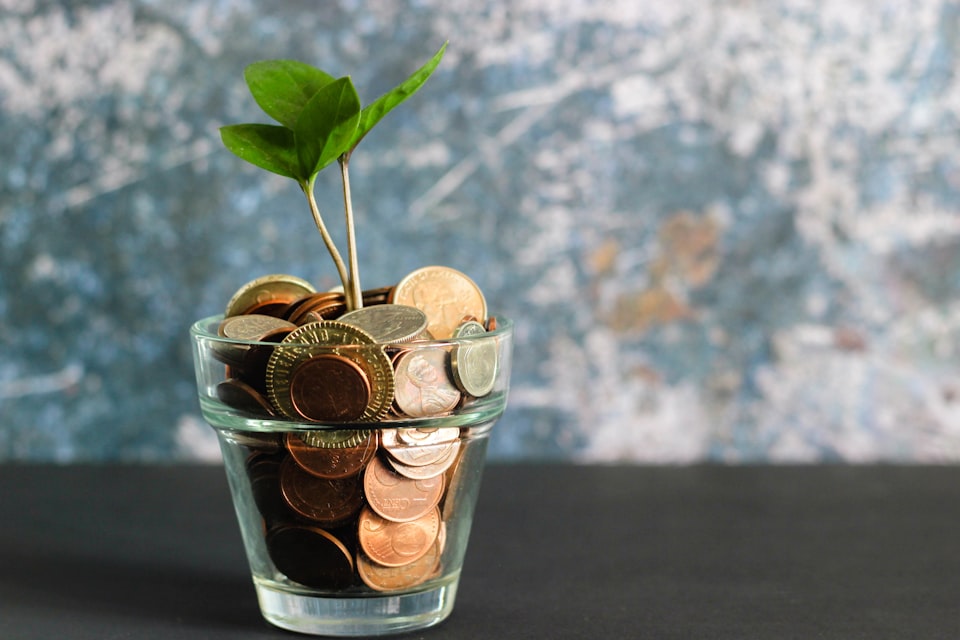
If you enjoy watching videos, here’s the video version of this article:
“The cost of a thing is the amount of what I will call life which is required to be exchanged for it, immediately or in the long run.” – Henry David Thoreau
In life, there’s a cost to every action or decision we make (or don’t make). Some of these costs are explicit, some implicit, but the most dangerous are those paid unknowingly..
These unconscious costs are the parts of life we give away immediately, or in the long run without realizing.
Last week my fiancée Emily told me she needed to get up at 6 am to pick up some free plants from the Facebook marketplace.
Free plants? Awesome.
Her getting up at 6 am? I was suspicious…

Why? Well if you know Emily she hates getting up early, as in audibly expressing agonizing pain if she’s woken up before 7:30 am on weekdays or 11 am on weekends…
The next thing I find out is that these plants are 45 mins away which means a 90-minute round trip. Add to that, she will need to dig these plants out of the ground.
The Real Cost of “Free” Plants:
- 2 hours less sleep
- 90-minute drive + gas mileage
- 30 minutes digging these plants out of the ground
Suddenly these “free” plants are feeling expensive.
It’s not her fault though as the cost of “free” has been scientifically proven to make us irrationally excited, to the point where the rest of our brain shuts down any further decision-making.
It’s the reason people take free trinkets they don’t want, why people return to the buffet line after they’re already full, and why thousands of people across the U.S. will wait on July 11th in the humid summer heat for a Slurpee at 7/11 — because it’s free.
Confession: I’ve been one of those 7/11 slurpee people. In fact the only time I have a 7/11 slurpee is when they’ve been free. I don’t even like slurpees… but when they’re free. Hell yes, I’ll get one.
Now let’s jump into what this piece is all about; decision-making filters…
The filter we apply to decisions defines how we understand the costs involved.
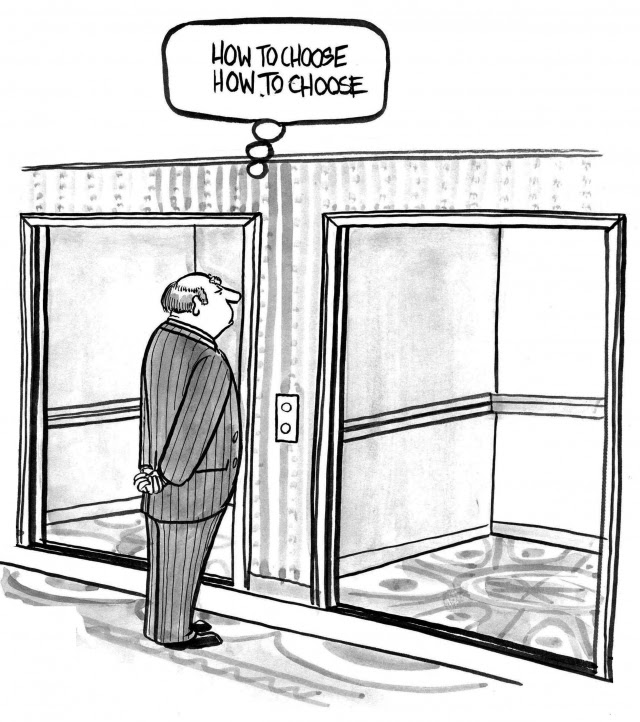
Here are the 3 filters I consider in my decision-making:
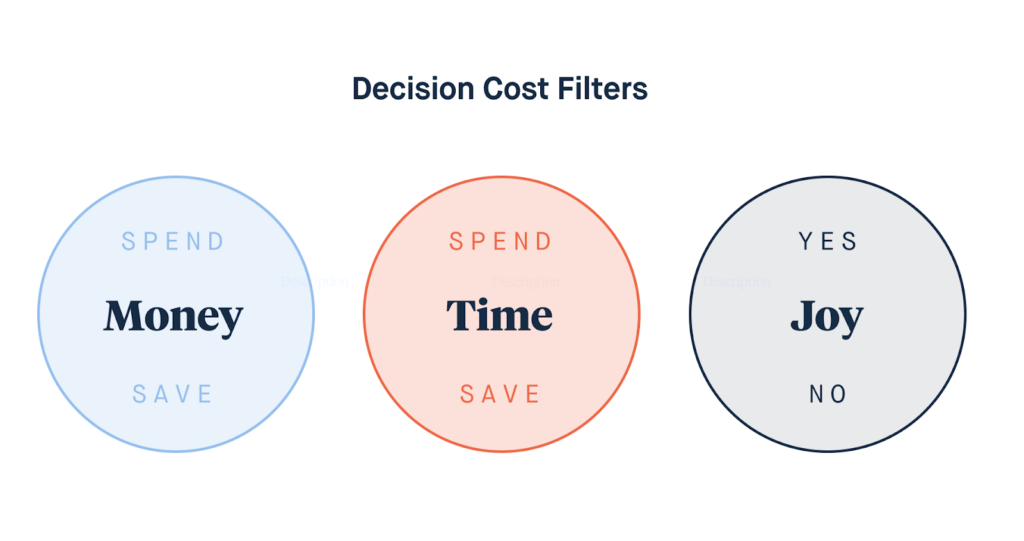
- Money — What we pay or save
- Time — Time spent or saved
- Joy — Enjoyment has gotten or lost
If your primary lens is money the free plants look like a great deal — and as studies have shown, it’s a powerful component.
Or if you enjoy long drives and digging up plants for free, it’s also a great deal…
There’s a saying in the design world “Good, Fast, Cheap — you can only pick 2”
In a Venn diagram, it’d look like this:
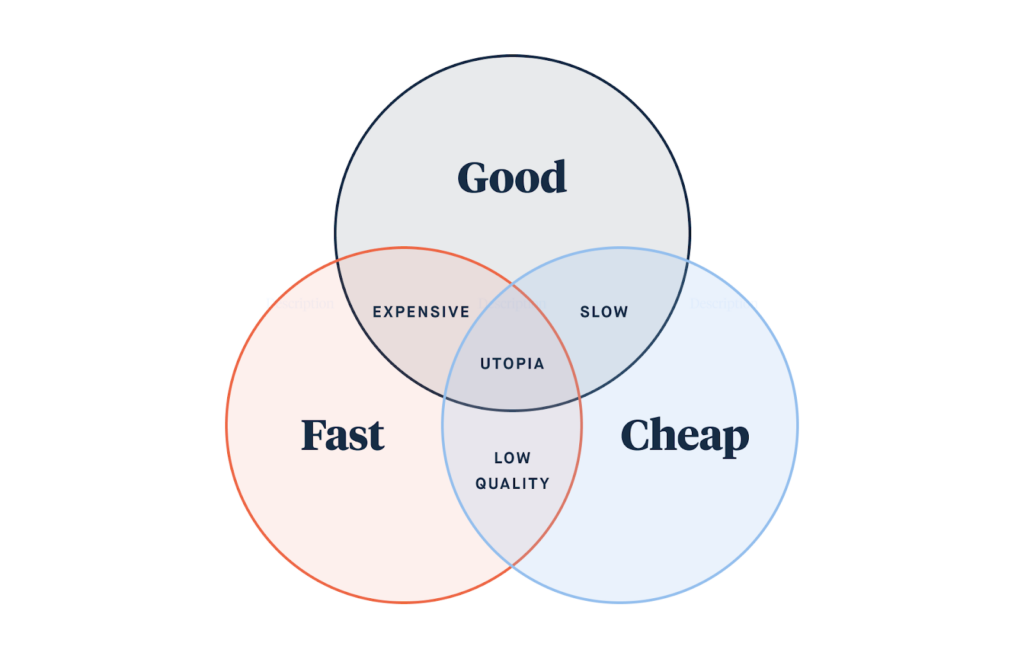
I consider the same for basing decisions on money, time or joy. We can only pick 2 in the majority of scenarios — utopia is getting all 3.
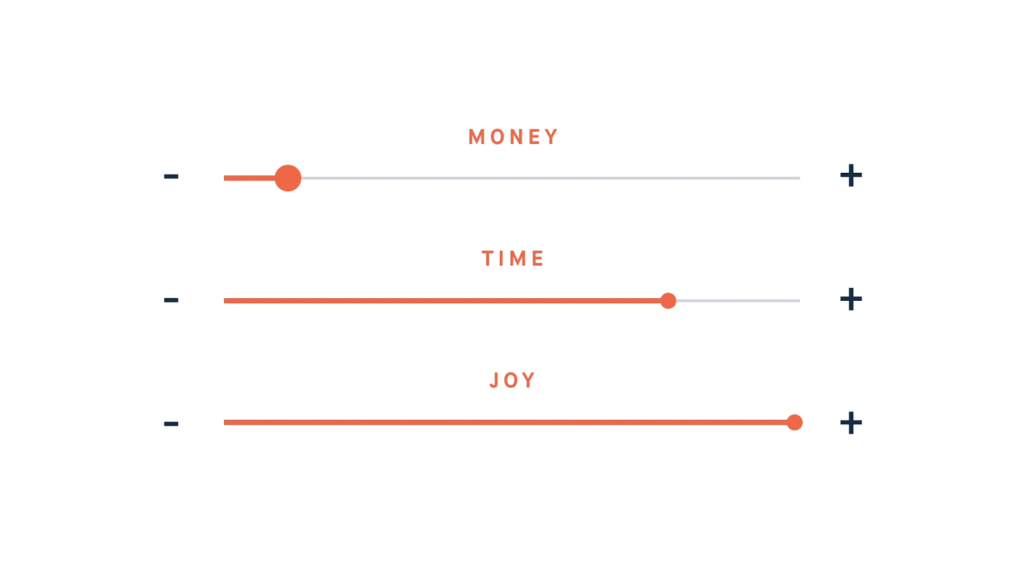
Everything is a tradeoff, you just have to know in advance what you’re trading in the exchange to understand the true costs.
A good decision is when the benefit you get exceeds the cost you paid.
In the case of the “free” plants mentioned above:
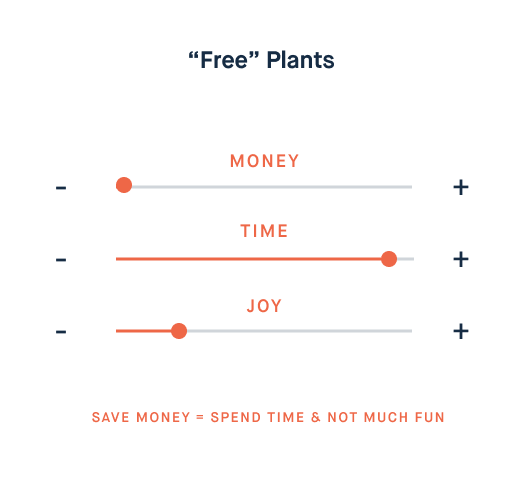
Understanding your lens
The lens we filter decisions through can (and should) change throughout our lives as circumstances change.
But how do we know what lens we’re wearing or how we see things?
Sometimes we don’t know
The late David Foster Wallace’s commencement speech called This Is Water, starts with a humorous parable about perspective:
There are two young fish swimming along who happen to meet an older fish. The older fish nods at them and says:
‘Morning boys, how’s the water?’
The two young fish swim on for a bit and then eventually one of them looks over at the other and asks:
‘What the hell is water?’
How much of the filters we use are subconscious, pre-installed through our parents?
If you’re brought up poor with a background of using money as a primary lens to filter decisions through, that could remain into adulthood — even when life no longer leaves you scarce of the same resources.
This was the case for a friend who perfectly showed this once when we went out for ice cream. He wanted toppings, picked out a few… but then asked for the cost of them before placing the order. They were 20 cents each, which would have added a whopping 60 cents to his total… so he decided to go without.
Please keep in mind that this man’s net worth is comically large, but here he is nitpicking ice cream toppings. He was looking at it through a money lens and made the money filter primary over enjoyment (and maybe 5 minutes less needed on the treadmill the next day).
It was only after I asked about his decision-making on the toppings did he recognized that it was something he’d taken from his childhood without realizing it.
When we’re young we have more time and less money so we align ourselves to make money and give up our time. When we’re older this is often the opposite — so we should be aware and adjust our filters accordingly.
I remember in my younger years I was the stray kid roaming the neighborhood offering to mow lawns or clean cars for extra pocket money. My parents often got concerned calls from neighbors asking if they knew where I was and what I was doing. Luckily I was in a safe neighborhood and my biggest concern was embarrassing my parents…
(sorry mum and dad)
The point is, I had a lot of time on my hands and wanted to make money. Now I’m in my 30’s and I’m waiting for some kid like me to knock on my door.
If your primary lens is your time you’re willing to trade your money for it and enjoyment.
This might look like hiring an assistant or a house cleaner to save you time and give you the joy of doing something else you enjoy besides cleaning (hello me!).
Some examples of other tradeoffs:
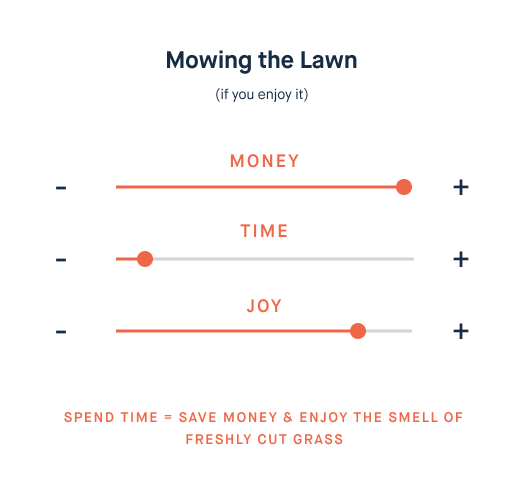
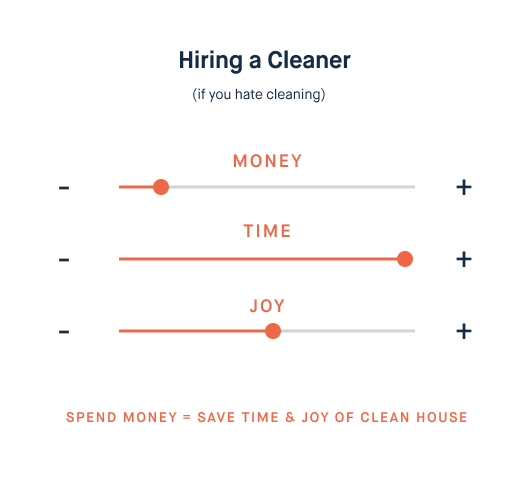
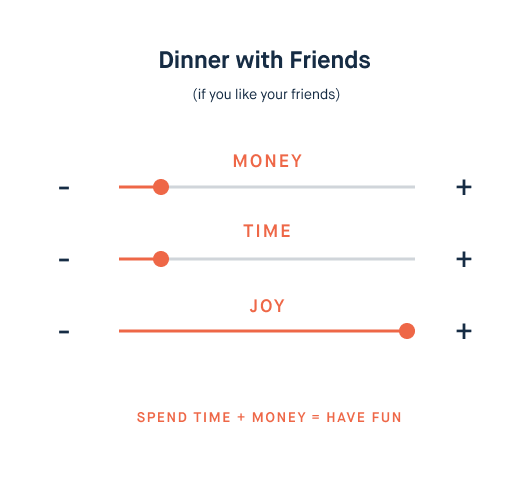
I’ve realized that my primary lens is time and usually my first consideration.
I like to be efficient, delegate and use my time as wisely as I can. This generally means if the benefit to me is more than the cost to save me time — it’s a yes from me.
But just like money being your primary lens has its issues, so does time.
A well-lived life is not about optimizing and saving time on every part of your life. Not everything in life should be optimized and made efficient. Many of life’s joys involve being present, going slowly and taking our time.
(Probably where the saying “take your time” comes from)
That’s a lesson I’ve learned in the past year living in Austin where I go out for a coffee with friends and spend an hour chatting rather than making one at home. It’s also doing weekly 3-4 hour long dinners with friends which involve cooking, drinks, long conversations, etc. It costs time and a little money but I get a lot of enjoyment from it.
As I’ve met happy successful people, I’ve discovered that a commonality is prioritizing joy over time and money — but only after they’ve already “made it”. It’s as if they’ve realized that money won’t make you happy and there’s no point in having more time if you don’t have joy.
Having joy as a primary filter is a privilege most people don’t experience. By this point, you’ve likely ascended Maslow’s Hierarchy of needs toward self-actualization. It takes solving lower-level problems with time and money to get here — or privilege.
This 2-minute video by Casey Neistat is a good demonstration of why:
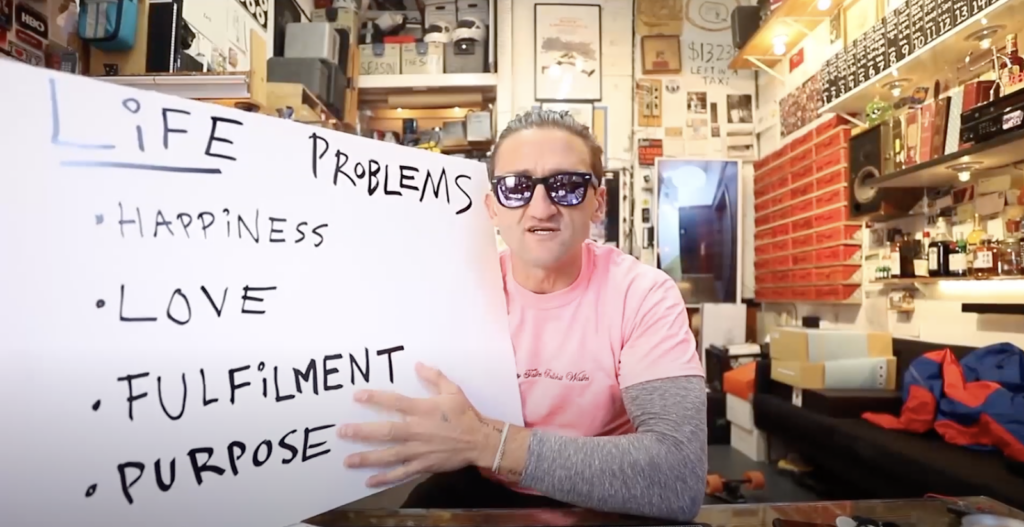
When you learn to look at problems through different lenses, an effective solution will become clear.
It’s also not a bathrobe — by that I mean it’s not a one-size-fits-all model. A great decision for me may not be the same for you as we have different filters on what we value and where we are.
Understand the amount of your life you’re exchanging for something to understand the true cost; this means time, money and enjoyment.
TLDR; Check yourself before you wreck yourself.
Become a subscriber receive the latest updates in your inbox.


